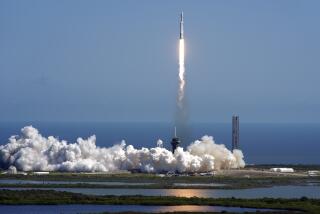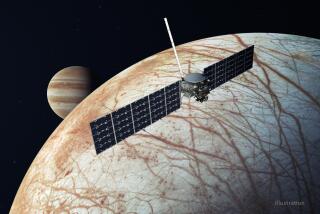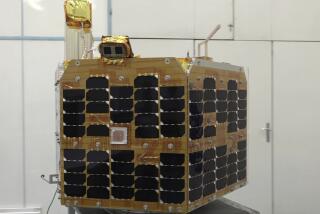Europeans to Survey the Moon
- Share via
KOUROU, French Guiana — Europe’s first mission to the moon blasted off Saturday night aboard an Ariane rocket that also carried two commercial satellites, space officials said.
The Ariane-5 rocket carrying a SMART-1 moon exploration probe took off from the European Space Agency launch center at Kourou on the northeastern coast of South America.
Forty-one minutes after the launch, the rocket released SMART-1 into space for a 15-month journey to lunar orbit. The 815-pound probe will scan the moon for up to 30 months.
The probe is designed to provide data on the origin of the moon and search for signs of water and ice.
“Thirty-five years after Apollo and the Russian missions, there remains much we don’t know about the moon,” David Southwood, the space agency’s director of scientific programs, said at a news conference. He said he hoped that a Mars mission would follow.
The European Space Agency has hailed SMART-1 as an example of a “faster, better, cheaper” mission costing $126 million, about one-fifth the usual cost of a major science mission by the agency.
The rocket also carried an INSAT-3E satellite for the Indian Space Research Organization and an e-BIRD for Eutelsat, a Paris-based satellite operator.
The Ariane was not the only craft launched Saturday.
In Nigeria, millions watched a live broadcast as their impoverished nation’s first satellite blasted into orbit aboard a Russian rocket launched from the Plesetsk cosmodrome.
“It makes me proud to be a Nigerian,” said Prosper Sunday, a 27-year-old security guard in the commercial capital, Lagos. “It shows our nation is progressing. We’ve joined the space age.”
The government plans to use the $13-million satellite to monitor water resources, soil erosion, deforestation and natural or man-made disasters, space agency spokesman Solomon Olaniyi said.
It will also be used to survey military facilities and the country’s crude oil pipelines and infrastructure. Nigeria is one of the world’s largest exporters of oil, but thieves siphon off hundreds of thousands of barrels daily.
Nigeria is struggling to provide 129 million citizens with clean water, basic health services and education, and praise for the launch was not universal.
“The satellite is a waste of money,” said Gabriel Mordi, who was selling mobile phone cards on a dusty street in Lagos. “They should be helping the poor. Most people here are just struggling to find something to eat.”
More to Read
Sign up for Essential California
The most important California stories and recommendations in your inbox every morning.
You may occasionally receive promotional content from the Los Angeles Times.













